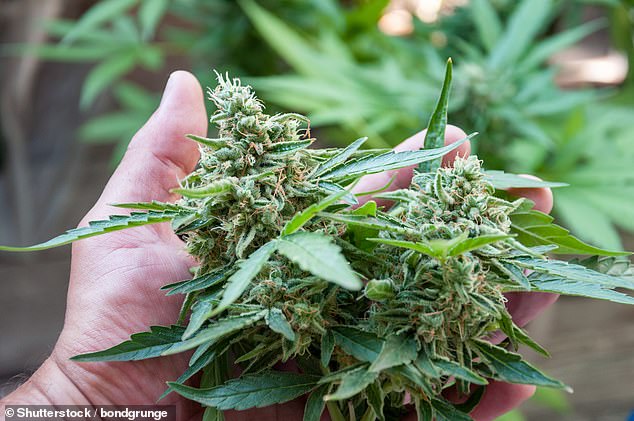Women are being ‘let down’ by research on cannabis ‘because scientists only care about the drug’s effects on men’
- Experts reviewed years of scientific literature behind cannabis and psychosis
- They claimed ‘we are still not in a position to say the drug causes the condition’
- And the pair of researchers uncovered a ‘gender bias’ throughout the research
- They warned the link between psychosis and cannabis in women is a mystery
Women are being ‘let down’ by research on cannabis because scientists only gear their studies towards men, experts claim.
Two drug researchers reviewed years of scientific literature behind the drug’s link with psychosis, which can drive patients to suicide.
In a damning verdict, they said ‘we are still not in a position to say cannabis causes psychosis’ – despite decades of costly research.
And they found a ‘gender bias’, warning the link between psychosis and cannabis in women is currently a mystery because of a lack of studies.

Two experts reviewed years of scientific literature behind the drug’s prominent link to the mental health condition, which can drive patients to suicide
Ian Hamilton, who led the study and is based at York University, told MailOnline: ‘Research is letting women down.
‘We should be spending research money on improving the information we have about the risk women face when using cannabis.
‘The research to date is completely biased towards men, a situation not helped by mainly men being in control of this research.’
The research of existing literature, published in Current Psychiatry Reports, was a review of dozens of scientific studies.
A substantial body of research, dating back a century, already exists to link smoking cannabis to psychosis, which often causes hallucinations.
But the review suggested the evidence for cannabis acting as a causal factor for the condition ‘has so far not been established’.
Mr Hamilton, who conducted the review of literature with Mark Monaghan from the University of Birmingham, said: ‘Research needs to extend beyond males.’
He warned no knowledge over the link between cannabis and schizophrenia will be gained unless experts start to include women in their studies.
Defending previous studies, Mr Hamilton said: ‘For researchers its a lot of easier to get people in treatment because they are already there.
‘But the problem of doing that is there is more men in treatment than women, so this is also added to this distorted view of cannabis and psychosis.
‘We don’t know enough about young women.’ He added it would be ‘remarkable’ if they were immune from the risk of psychosis.
‘I think a lot of money has been wasted replicating research that keeps trying to find and pin down a causal relationship between cannabis and psychosis,’ he said.
‘But it’s never going to happen. It’s too complicated. Instead, money should be spent on finding out the proportion of women who are at risk.’
Mr Hamilton said it is ‘clearly important’ that researchers investigate the risks for women not just men because of how many use the drug.
The British Crime Survey estimates that around one in 10 women use cannabis – the most widely used recreational drug in the world.
Possession of the class B drug carries an unlimited fine and up to five years in jail, while dealers face 14 years in prison.
Discussing the gender bias, he told MailOnline: ‘In effect there are too many male researchers observing male cannabis users.’
Mr Hamilton added that, as a result of this, ‘we know very little about what the risks of psychosis are for women who use cannabis’.
He accepted that he knows his opinion sounds ‘obvious and daft’, adding too many senior researchers investigating cannabis are men.
Mr Hamilton said: ‘If you had some females in senior positions guiding research, they would bring a woman’s perspective to it.’
The NHS states cannabis is a drug ‘known to trigger psychotic episodes’. Others include cocaine, ecstasy and ketamine.
Powerful ‘skunk’ cannabis flooding the streets of Britain increases the risk of psychosis five-fold, a major study revealed in March.
The problem is so widespread that nearly a third of psychosis cases in London are caused by the drug, King’s College London researchers found
They warned that 94 per cent of all cannabis available on the streets of the capital is now in the form of skunk – purposely grown to have a high THC content.
Voices are growing for cannabis to be legalised in Britain, mainly driven by the Government’s decision to make it available medically last year.
Some supporters, including former deputy prime minister Sir Nick Clegg, believe making mild forms of the drug legal would stop people buying THC-abundant skunk.
But studies have suggested the potency of strains in Canada and the US, where cannabis is legal in some parts, has actually increased.
Mr Hamilton was behind research in 2017 that suggested the risk of developing psychosis as a result of smoking cannabis is much lower than first thought.
But he said the studies clearly showed that the stronger the weed, the more likely someone is to develop mental health problems.


